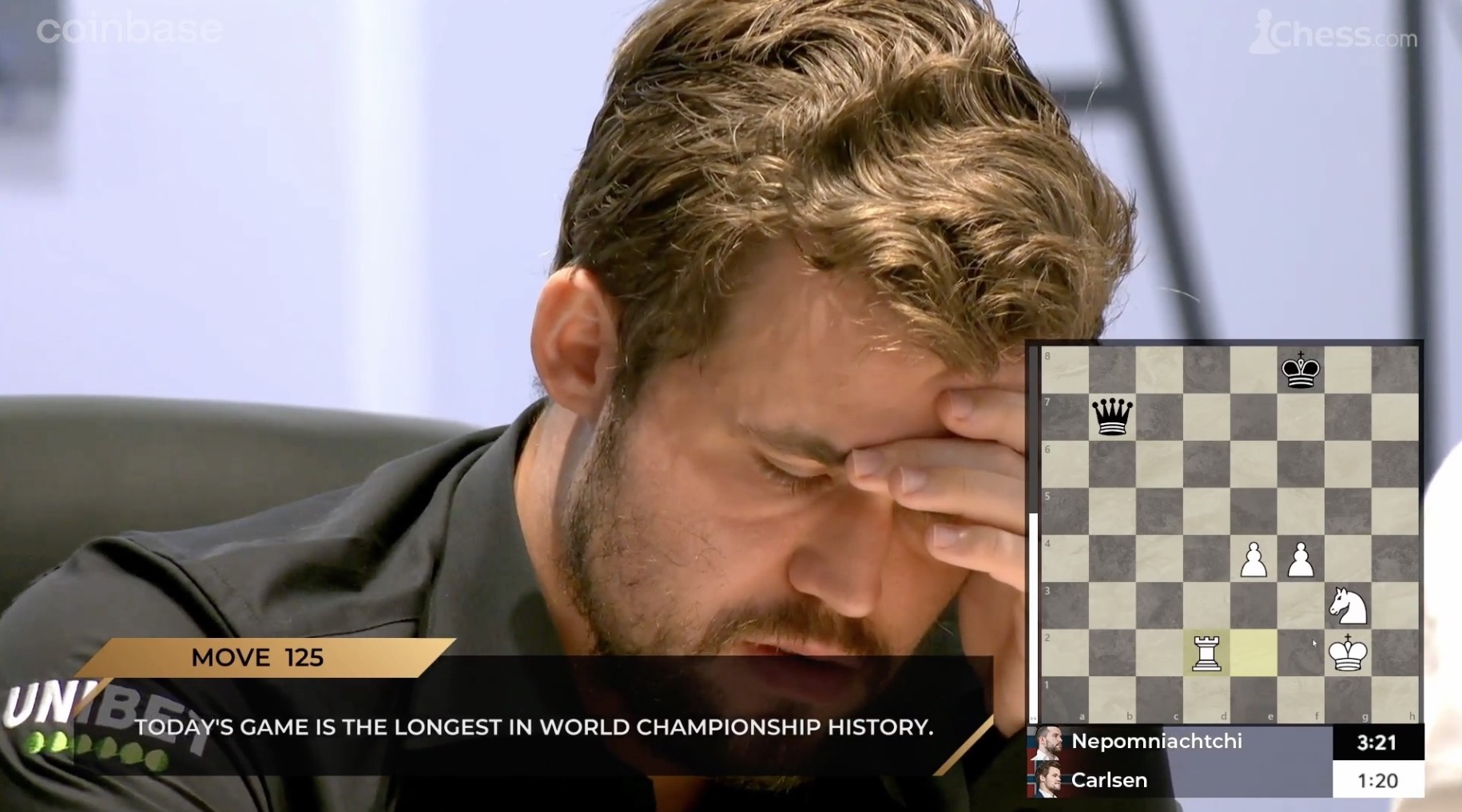After 136 moves and seven hours and 45 minutes of play, Magnus Carlsen pulled off a feat unseen at the World Chess Championships for five years: He won a game. The four-time defending champion took a commanding 3.5-2.5 lead over Russian challenger Ian Nepomniachtchi on Friday after winning a seemingly interminable game that will go down as one of the greatest of (at least) the modern era. The game ended just after midnight in Dubai after starting at 4:30 p.m. local time, making it the longest game by both moves and time in chess World Championships history, as well as the first game of the modern championship era to start and end on different days.
After 136 moves...CARLSEN WINS GAME 6! 🤯🤯🤯
— Chess.com (@chesscom) December 3, 2021
The first decisive game in a classical World Championship game in 5 YEARS! #CarlsenNepo pic.twitter.com/fqO38H54ls
It is worth spelling out just how rare a win is at the World Championships. At the highest levels of chess, classical games are ending in draws more often than ever, as players have learned to study and take advantage of chess computers' ability to pick out the mathematically correct lines from any position. Carlsen has defended his classical chess title four times since winning it in 2013, but he hasn't actually won a game since 2016. He beat Sergey Karjakin that year and Fabiano Caruana in 2018 in the tiebreak rounds, which feature games with shorter time limits and therefore less time to determine the mathematically correct move.
The first five games of the 2021 Championships were notable for how even they've been. According to computer analysis, Carlsen and Nepomniachtchi have played some of the most harmonious chess ever, which is great for them but also had made for a pretty boring Championship. Nepomniachtchi had a sliver of an opportunity to punish Carlsen with the white pieces in the fifth game, though a moment of passivity cost him tempo, and things ended up even. The Russian had shown no weakness through the first five games, and both men had clearly prepared enough for every one of their opponent's preferred strategies.
Today, however, Carlsen threw an unorthodox opening—the queen's pawn Psuedo-Catalan—at Nepomniachtchi, and the game reached an unforeseen level of intrigue very early. Carlsen sacrificed a pawn on the 10th move of the game in order to maneuver better control of the left side of the board, and Nepomniachtchi raised the stakes even higher with his 25th move. The Russian challenger offered Carlsen both of his rooks for the Norwegian's queen, and Carlsen accepted.
Black just played Rac8, offering two rooks for the queen! Here we go! #CarlsenNepo pic.twitter.com/EhXUxNFYjk
— ChesscomLive (@ChesscomLive) December 3, 2021
The game was hanging in the balance in the lead-up to the first time control, which produced to a thrilling series of positions. Carlsen had just three minutes compared to Nepomniachtchi's 23, and while he had a slightly better position, converting that to a winning one in three minutes would have taken a superhuman level of board vision. With seven moves before he earned an extra hour of time, he made an overly defensive move and surrendered the momentum to Nepomniachtchi. But Nepomniachtchi started to run into some time trouble of his own, so both players were forced away from more aggressive, risky lines at a time when either could have perhaps pressed for a winning advantage.
With time no longer an issue, Carlsen traded one of his pawns on the rim for Nepomniachtchi's troublingly advanced pawn on the A-file. Both players zipped their material—two rooks for Carlsen vs. a queen and a bishop for Nepomniachtchi—across the open board until Carlsen engineered a devastating swap, trading one of his rooks for a pawn and the bishop. Nepomniachtchi had the most powerful piece on the board, but Carlsen had guaranteed he at least wouldn't lose, and he started hunting the win as the second time control approached. The game transitioned from long to historically long as Carlsen chased around Nepomniachtchi's queen for 28 moves, until he finally got into position to yeet forth his pawns and trap Nepomniachtchi in an endgame he couldn't escape from. It was a masterwork of patience and subtlety.
Turning point in the endgame. Black should have gone Qb6+! forcing the knight to d4, because as Magnus pointed out right after the game, once the knight (which moves in L shape) gets to g3, it becomes very hard to hold. pic.twitter.com/8BWMTIsPA4
— Anish Giri (@anishgiri) December 3, 2021
Carlsen has not won the Championship yet, though he is now in prime position to see the last eight games out. Thursday was a rest day, so both players will have to turn around and play twice before they can unclench their brains. Having to analyze increasingly complicated positions for almost eight hours has a real mental strain, and given Nepomniachtchi's aggressive, control-centric style, we are probably moving away from the historically safe chess of the first five days.






